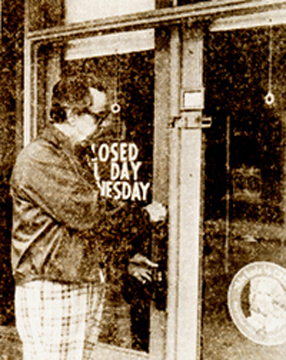Between 1956 and 1964, I routinely patronized McElyea Shoe Repair and Harness Shop at 127 Spring and Jobe (now State of Franklin Road). The owner, Robert McElyea, repaired my damaged or worn-out shoes while I patiently waited in a chair in my sock feet.
The still-standing two-story white building had never known anything but the harness business. C.W. Seaver built the structure in 1907 after learning the trade in 1896 from his half-brother, George C. Seaver. The businessman previously ran a harness store on Spring Street where the Cherry Street parking lot is now located.
Seaver arrived in Johnson City in 1873, when the population was 250 people. Stepping-stones were positioned at strategic locations on Spring and other streets so pedestrians could cross from one side to the other without trekking through mud or dust. Harness shops were popular sites for social gatherings. Farmers brought produce to town to sell or barter, picked up needed supplies and then assembled at the nearest harness shop, usually congregating around a big pot-bellied stove swapping tall tales and exchanging local gossip. All the while, the ladies shopped in the surrounding downtown stores acquiring sundry items such as calico, ribbons and grocery staples.
During the usual chitchat, Seaver was busy fitting teams of horses with harnesses that would stand the rigors of fully loaded wagons traveling over crude unpaved narrow roads beset with potholes and rocks. The owner was known to occasionally become stern with patrons when he found a horse with blemishes caused by an improperly fitted harness. His distinctive trademark was a circular belt with these words in the middle: “C.W. Seaver, Harness Maker.”
Business opportunities abounded in infant Johnson City from a variety of sources – traveling circuses, young boys with goats hitched to small wagons and downtown peddlers employing dogs to pull their carts. In 1903, the building of Soldiers’ Home (VA Center) brought about a boom in harness business when as many as 100 teams worked on a single grading job.
With time brought progress. Electric lights, paved streets and fancy automobiles slowly arrived on the scene. Although the primary mode of transportation was altered from four-legged horses pulling buggies to four-wheeled cars, it did offer one distinct advantage for leather workers. People could then travel long distances in modern vehicles to harness shops without having to depend on their animals to get there. Even with reduced demand, there was still enough business to sustain the business, at least for a while.
In 1945, 81-year-old C W. Seaver sold the shop to his nephew, George F. Seaver, who ran it another 10 years. Robert McElyea took over the reins of the operation in 1955. Fittingly, the new owner almost immediately added shoe repair to his menu of services in addition to his harness, saddle and bridle work. He had learned the trade by working at a harness and shoe repair shop in Elizabethton owned by a Mr. Riddle. Robert acquired much of the store equipment as part of the sale agreement, including two old tables that dated back to 1907.

On Tuesday, March 30, 1976, after nearly 21 years of service to the city, McElyea said “whoa” to his downtown profession, closed and locked the front door of his store for the final time. It symbolically and sadly represented the end of a nostalgic era.
